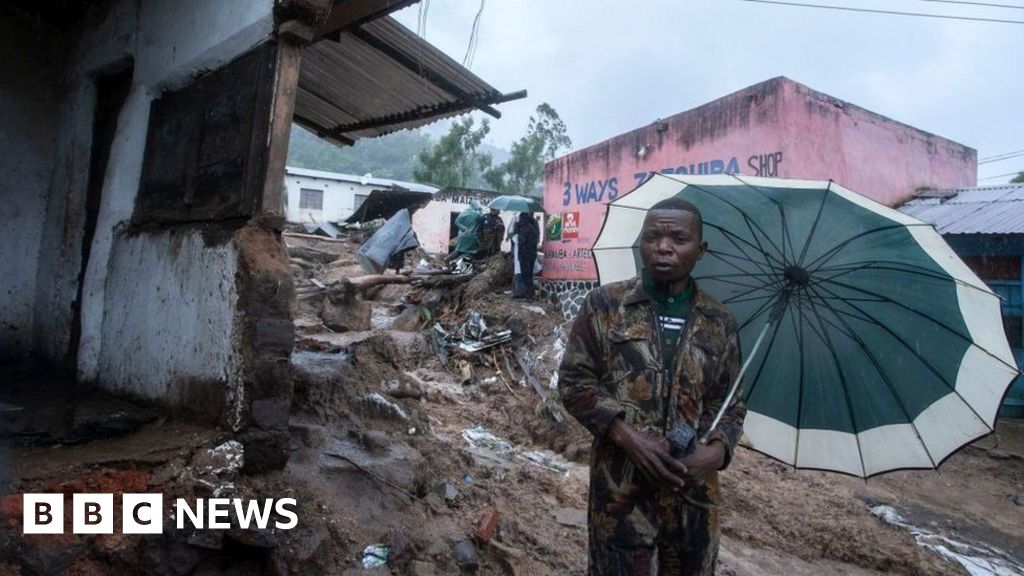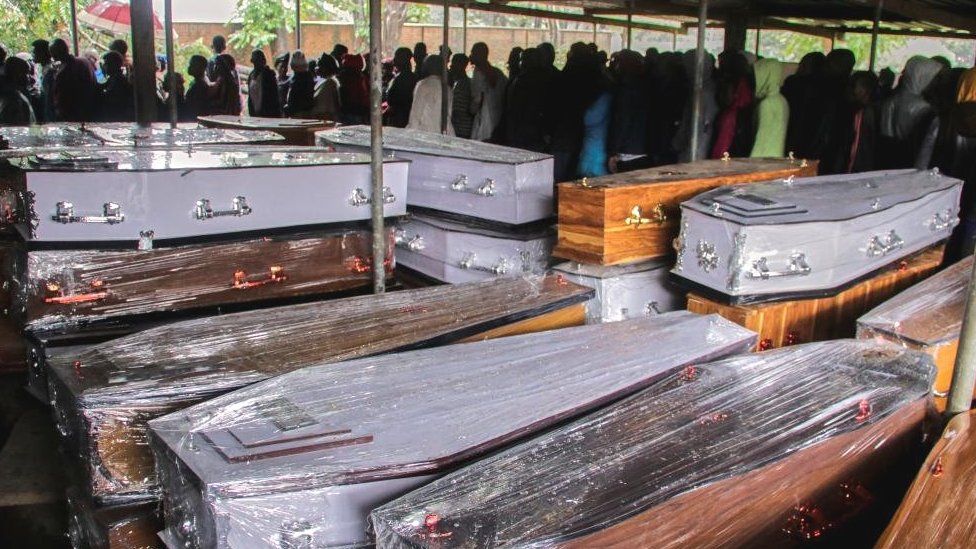

People in Blantyre are lining up at a hospital mortuary to search for their relatives’ bodies
By Peter Jegwa
Lilongwe, Malawi
Two soldiers have spent the night on a tree-top in flood-devastated Malawi to avoid being swept away by the powerful currents of a river below them.
The soldiers were on a mission to rescue flood survivors when their boat capsized, forcing them to swim until they reached a tree.
Southern Malawi has been battered by Tropical Storm Freddy, with 225 people killed and 20,000 displaced.
Rescuers have been using shovels to find survivors buried in mud.
Malawi’s main city, Blantyre, has been worst-affected, with many people, including children, dying in landslides in the hilly city.
Some homes have crumbled into flood waters, while others have been entirely swept away.
Recalling how he helped rescue a child, Blantyre resident Aaron Ntambo said: “The child was stuck up to her head in the mud. She was crying for help. Even though the water was very strong, we managed to cross and rescue her. It was very difficult but we managed to pull her out.”
The government has declared a state of disaster in 10 districts that have been hardest-hit by the storm.
The collapse of roads and bridges has hampered rescue operations, while helicopters have had difficulty flying because of the heavy rains and strong winds, although these have now eased.
The emergency services have been overwhelmed, with the military and police playing a crucial role to rescue communities stranded on higher ground.
The soldiers who took up shelter on a tree-top were on a boat that was despatched on Tuesday to rescue families trapped in a village in Mulanje district, about 80km (50 miles) from Blantyre.
Two other soldiers and a civilian managed to swim to safety after their boat experienced engine trouble and capsized, but the other two were reported missing, raising fears that they had drowned.
The defence minister later announced that the pair had been spotted on a tree – and a military helicopter was being sent to rescue them.
The helicopter is also expected to fly to the village to airlift families desperately waiting for help.
In another village in Mulanje, a man sent a WhatsApp message on Tuesday, saying heavy rains and winds were surging towards them from two mountainous areas.
“We have no hope, nowhere to go,” he said, adding that women, children and the elderly were among those who needed to be evacuated.
It is unclear whether a rescue team has reached them.
Freddy has dumped the equivalent of six months of rainfall in six days on Malawi and neighbouring Mozambique.
About 20 deaths have been reported in Mozambique.
UN official Myrta Kaulard said the devastation in Mozambique was not as bad as feared because its government had invested in flood defence measures after being hit by tropical storms for the past three years.
“This is a huge demonstration of how much huge investments are required because of the intensity of climate change on a country like Mozambique,” she told the BBC’s Newsday programme.
Freddy is one of only four storms in history to traverse the entire Indian Ocean from north-western Australia to mainland Africa. Freddy could also be the longest-lasting tropical cyclone on record, according to the World Meteorological Organization.
On Sunday the storm struck Mozambique as a cyclone – for the second time in a less than a month – after battering the island nation of Madagascar in the Indian Ocean, causing severe destruction.
Experts say climate change is making tropical storms around the world wetter, windier and more intense.
The death toll is expected to rise in Malawi as some areas remain cut off because of relentless rain and fierce winds.
The storm has also crippled power supplies, with most parts of the country experiencing prolonged blackouts.
The national electricity company said it was unable to get its hydro-power plant working as it had been filled with debris.


